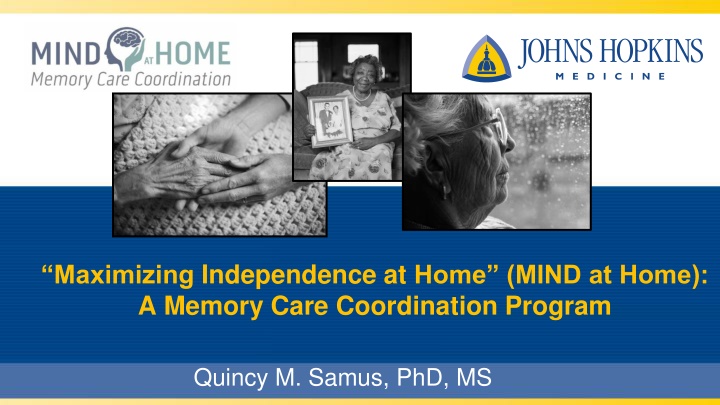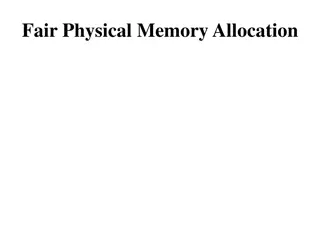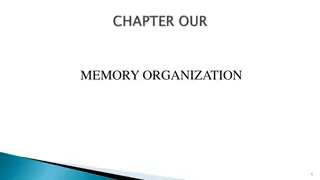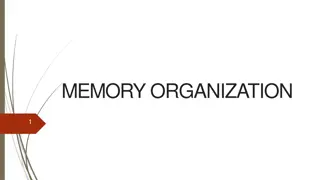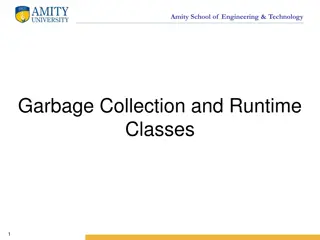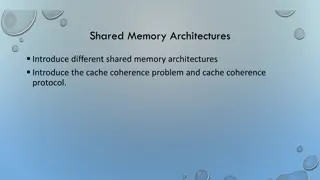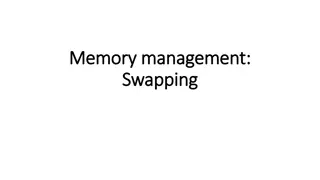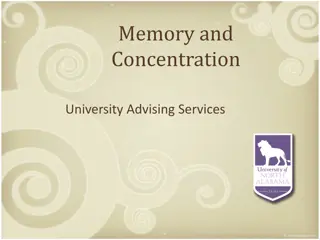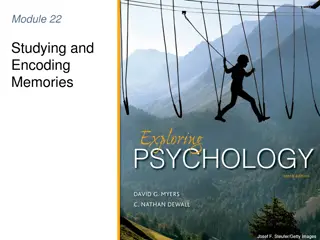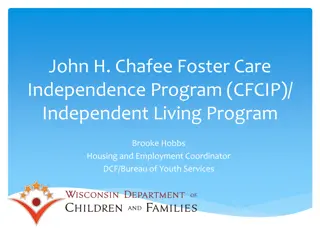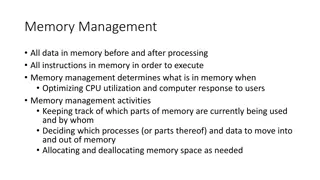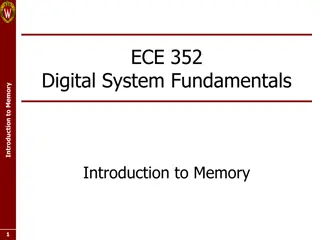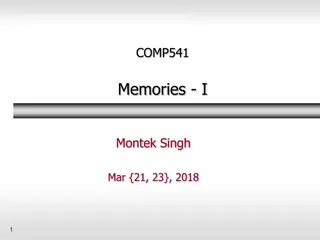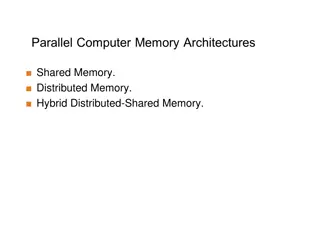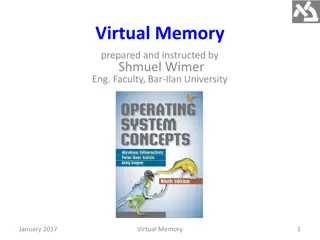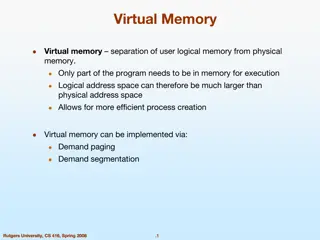Maximizing Independence at Home (MIND at Home): A Memory Care Coordination Program
Maximizing Independence at Home (MIND at Home) is a memory care coordination program initiated by Dr. Quincy M. Samus, focusing on home-based, individualized care strategies for those with memory disorders. Supported by various organizations, the program aims to enhance quality of life, reduce caregiver burden, and connect individuals with necessary medical, social, and supportive services. Through pilot studies and a streamlined model, MIND at Home facilitates aging in place while addressing unmet needs effectively.
Download Presentation

Please find below an Image/Link to download the presentation.
The content on the website is provided AS IS for your information and personal use only. It may not be sold, licensed, or shared on other websites without obtaining consent from the author.If you encounter any issues during the download, it is possible that the publisher has removed the file from their server.
You are allowed to download the files provided on this website for personal or commercial use, subject to the condition that they are used lawfully. All files are the property of their respective owners.
The content on the website is provided AS IS for your information and personal use only. It may not be sold, licensed, or shared on other websites without obtaining consent from the author.
E N D
Presentation Transcript
Maximizing Independence at Home (MIND at Home): A Memory Care Coordination Program Quincy M. Samus, PhD, MS
Current Financial Support National Institute on Aging Centers for Medicare and Medicaid BrightFocus Foundation Broadmead Retirement Community (JHU consultant contract) Welltower (JHU consultant contract) The project described in this presentation is supported by Grant Number 1C1CMS331332 from the Department of Health and Human Services, Centers for Medicare & Medicaid Services. The contents of this presentation are solely the responsibility of the authors and do not necessarily represent the official views of the U.S. Department of Health and Human Services or any of its agencies.
Program origin and vision Photo: Paula Tillman-Hoffberger Origin Conceived by Roy Hoffberger & Kostas Lyketsos Grassroots, philanthropic collaboration Recognition great unmet needs in the community but effective care strategies available Vision Home-based, care coordination Family-centered, individualized (not one-size fits all), evidence- based Goals of care patient-centered (age-in-place, quality of life, reduce caregiver burden) Proactive and pragmatic Platform to connect the dots for medical, social and supportive care and services, technology
Pilot studies Phase 1 Tested a dementia case finding method Developed needs assessment tool Initial prevalence unmet needs Developed protocol Phase 2 Pilot RCT of MIND on aging in place among community-living persons with memory disorders (18m, n=303) PTs: Delayed transition from home, improved quality of PT life, reduced unmet needs CGs: time savings (i.e. fewer hrs per wk with PT), reduced burden Samus et al., American Journal of Geriatric Psychiatry, 2014 4
MIND at Home Model (Streamlined, PLUS) Home Setting Person with Dementia/ Family Caregiver Primary Care and Specialty Care Provider Educate/Navigate/Support Social and supportive care services Community Resources Direct Consultation on Complex Issues/ Full Needs Assessments Memory Care Coordinator Facilitate/Coordinate Aging Services Regular clinical expert support Other community resources Geriatric Psychiatrist Registered Nurse Occupational Therapist
MIND at Home minimum core (Streamlined) 1. Initial JHDCNA needs assessment (PT & CG) 3. Monitoring and revision of care plan MCC direct encounter every 30 days Quality reviews, every participant, every 60 days by clinical supervisor Weekly care team rounds (challenging/complex cases) Tracking encounters in Dementia Care Management System 2. Individualized need-based care planning and standardized MIND service delivery Written care plan (family and Primary care provider) Implement core care strategies per standardized protocol Disorder education Referrals and Linking Specific skills/strategies/problem solving-DICE Emotional support Symptom screening/ Needs Assessment Caregiver resource binder 4. Full JHDCNA In-Home Reassessment (every 9 months) 5. Critical Events protocols PRN telehealth visits within 1 week of discharge Transitions/discharges 6
How MIND works Care Needs Proximal outcomes Cognitive Reduce unmet needs Behavioral Primary outcomes Assess Home Safety Maximize QOL Medical care Delay transition from home Activity/Daily Living Reassess revise Plan Legal/Adv. Care Reduce behavior problems Care Financing Reduce NH expenditures/ total health care cost CG education Appropriate use of health services CG Skills Training Medical care Monitor Implement Mental health care Reduce CG burden Informal supports Legal
Stories from the field Working with a Physician Assistant to discuss a MOLST with a critically ill participant, who later died peacefully in own how, according to his wishes. Helping a family caregiver recognize symptoms of a urinary tract infection, who promptly called the PCP and obtained outpatient labs and treated potentially avoiding a ED or worse, a hospitalization. Providing emotional support and empowerment to a family caregiver, who at the initial home visit, was so overwhelmed that she was tearful through most of the interview, and 9 months later is now a Caregiver Advocate for the Alzheimer s Association. Assisting with overseas travel preparation for a person with mild dementia (recommended contacting PCP for advice on flying and blood clot prevention, creation of an ID pouch in case of getting lost) Assisting with calling Maryland Health Connection, after patient lost health insurance coverage, and was initially declined to have it re-instated. Assistance led to re-instating health insurance coverage so that the participant could obtain her medications. Assisting with ordering a bedside commode to prevent entering a nursing home. Now PT can make it to the toilet in the middle of the night instead of inappropriately urinating and ruining the hardwood floors. Helping to secure an Alzheimer s Association Caregiver Grant for a weekend get-a-way for a caregiver who had gone 8 years of daily caregiving without a full night respite.
Importance of working in the Home Over 90% of MIND PTs had safety unmet needs at baseline 10
What Families are Saying They are somebody. They are somebody. They have the right to be cared for. He is a good man [Thank you] for the practical assistance and moral support we re receiving from Mind at Home. In a rather bleak time for our family, this program has been a ray of hope. You are my angel. You lift me up .my emotions. All other programs are to help him. You help me. Photo: QMS with permission 11
2 Active research studies (RCT , CMMI project) Enrollment closing soon for MIND clinical trial Call 410-550-6744 or email mindathome@jhmi.edu Sustainability, scalability and dissemination, with well matched partners
The MIND at Home Team 2016 Coordinators, nurses, doctors, OTs, evaluators, and researchers Special thanks Co-Investigators: Deirdre Johnston, MD, Betty Black, PhD, Karen Davis, PhD, and Laura Gitlin, PhD 13
Thank you! Quincy Samus, PhD, MS Associate Professor Department of Psychiatry, JHU qmiles@jhmi.edu
